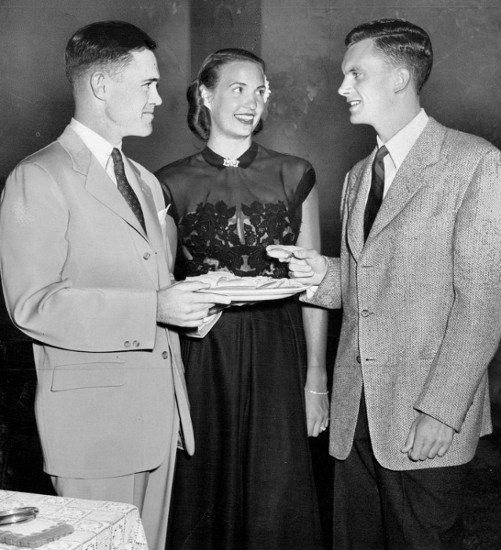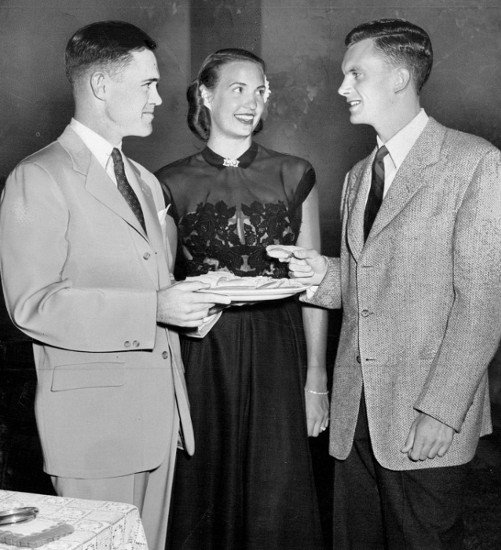
Editor’s note: The following essay — “The Fine Art of Living Together” by Bentley Bates — comes from The Boy’s Own Book of Leadership, published in 1933.
A heap of fellows think manners don’t amount to much. They have an idea it is sort of sissy to be polite. They’re not using their heads. Just as oil makes an engine run more quietly and easily and efficiently, so do manners make your life and the lives of the folks with whom you come in contact run more quietly and pleasantly and efficiently. Good manners are a mighty valuable asset that anybody can have cheaply.
“There is something which you owe to everybody and which has no exact date when it must be paid, because it is due every minute and second of your life. You owe courtesy to the strangest people. Actually, you owe it to your brother and sister. It doesn’t seem possible, but you do. And you owe it to your father and mother. You owe it the ash man and to washwoman. You owe it to the President of the United States and to the blind man who tries to sell you a lead pencil on the street corner. When you were born you gave the whole world a promissory note payable in courtesy, and you have to make it good every second of your life until you die. Do you know why people loved Abraham Lincoln so much? It was because he never forgot that he was paying his courtesy note,” says The American Boy.
A certain Harvard professor, in instructing a class in good writing, said to them: “To write well you must first think of your subject; second, think of the people you are writing to; and last, think of yourself.” These same simple rules may easily be made effective rules for a boy’s manners also. First, think of the demands of true sympathy and kindness; second, think of the person you are addressing; and last, think of what is owing to yourself, for the real secret of good manners is a kind heart.
The story is told of a certain office boy who kept a whole, big, busy office happy and agreeable and kindly disposed toward one another by his habits of courtesy and good will. One day the boss wheeled suddenly in his big chair and said: “Bennie, who on earth taught you to be so polite? You often make me ashamed of myself.”
Bennie smiled, grinned from ear to ear, stood on one foot a bit abashed, and then with a sudden inspiration replied:
“Well, sir, Mother is polite, Dad is polite, and — and oh, I guess I just caught it from them.”
Nothing in the world is so “catching” as good manners.
One of the surest of all tests of character is one’s manners. You do not need to know a boy intimately to judge him accurately. All you need to do is to watch him a bit in action; such as playing a game. If he is kind and sympathetic, if he is manly and honest and considerate, he will show these very qualities all over and over again in every game. Every boy at play is a walking advertisement of what he really is inside, and nothing is so difficult to successfully camouflage as bad manners, for they will show themselves at the most unexpected times and places. Manners, after all, are but the outside expression of what you are inside, and what you are inside will get out like the proverbial cat that is always coming forth just at the moment you want him kept out of sight.
The value of good manners can scarcely be overestimated. Roosevelt once wrote to his son, “My boy, study to be courteous.” There is a pleasant and an unpleasant way to perform all the little duties of life. There is a fortunate and an unfortunate way of meeting folks, of rendering countless little services, of speaking, acting, thinking; therefore, study to be courteous in them all.
A young lawyer once asked an old and successful judge how he might improve his individuality and power.
The old judge replied like a shot – “Constantly examine your manners.”
“Gentle manners bring to their possessor an influence which, though quietly exerted, is a power for usefulness in the world. In business, all transactions are helped by politeness; many men fail in life because their manner does not make a good impression, because their curtness and lack of good breeding repel others,” some one has well said, and Dr. Weir Mitchell adds: “Good manners, tact, patience – these characteristics often assist men to win who are really inferior to some who, for want of these very qualities, miss the place they would otherwise attain.”
The post The Importance of Good Manners appeared first on The Art of Manliness.
(via The Art of Manliness)
